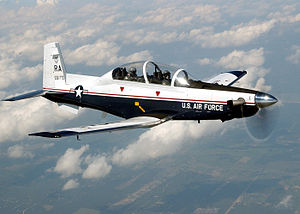Beechcraft T-6 Texan II
| T-6 Texan II | |
|---|---|
 |
|
| A USAF T-6A Texan II flying from Randolph Air Force Base. | |
| Role | Trainer aircraft |
| National origin | United States |
| Manufacturer |
Raytheon Aircraft Company Beechcraft Defense Company |
| First flight | 2000 |
| Introduction | 2001 |
| Status | In production |
| Primary users |
United States Air Force United States Navy Royal Canadian Air Force Hellenic Air Force |
| Produced | 2000–present |
| Number built | over 850 |
| Unit cost |
US$4.272 million
|
| Developed from | Pilatus PC-9 |
The Beechcraft T-6 Texan II is a single-engine turboprop aircraft built by the Raytheon Aircraft Company (which became Hawker Beechcraft and later Beechcraft Defense Company, and was bought by Textron Aviation in 2014). A trainer aircraft based on the Pilatus PC-9, the T-6 has replaced the Air Force's Cessna T-37B Tweet and the Navy's T-34C Turbo Mentor. The T-6A is used by the United States Air Force for basic pilot training and Combat Systems Officer (CSO) training and by the United States Navy and United States Marine Corps for Primary and Intermediate Naval Flight Officer (NFO) training. The T-6A is also used as a basic trainer by the Royal Canadian Air Force (CT-156 Harvard II), the Greek Air Force, the Israeli Air Force (Efroni), and the Iraqi Air Force. The T-6B is the primary trainer for U.S. Student Naval Aviators. The T-6C is used for training by the Royal Moroccan Air Force, the Royal New Zealand Air Force, and the Mexican Air Force.
The T-6 is a development of the Pilatus PC-9, modified significantly by Beechcraft to enter the Joint Primary Aircraft Training System (JPATS) competition in the 1990s. A similar arrangement between Pilatus and British Aerospace had also been in place for a Royal Air Force competition in the 1980s, although that competition selected the Short Tucano. The aircraft was designated under the 1962 United States Tri-Service aircraft designation system and named for the decades-earlier T-6 Texan.
...
Wikipedia
